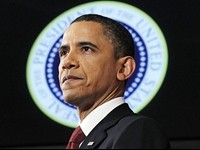President Obama’s favorite word, as we’ve learned repeatedly, is “I.” He uses it on a constant basis. He uses it to claim credit and to assign blame. He uses it to cajole and to threaten. He uses it to plead and to prod.
But he doesn’t use the word “I” purely out of ego. He does it because for President Obama, “I” represents the executive branch. And the executive branch, in Obama’s view, is the ruling branch of American government.
President Obama’s latest attack on the Supreme Court is just the latest evidence of his deep-rooted disdain not just for the Constitution, but for the system of checks and balances it represents. Prior to his election, Obama told Americans that we were just days away from “fundamentally transforming the United States of America.” He didn’t mean that simply in terms of policy, although he certainly wanted redistributionist policy to take center stage. He meant it in terms of governmental structure.
President Obama has made it his mission to wield the club against the other two branches of government in a manner unprecedented in American history. Yesterday, Obama, rejecting the heart of judicial review for purposes of his own power, stated, “I am confident that the Supreme Court will not take what would be an unprecedented, extraordinary step of overturning a law that was passed by a strong majority of a democratically elected Congress.” That, of course, is precisely what the Supreme Court does on a daily basis: it reviews acts of a democratically-elected Congress. The reason the justices are unelected is that they are supposed to be free of outside influences in defending and protecting the Constitution.
But for Obama, the Supreme Court is an obstacle to his own power. And so he goes to war with the Supreme Court. As I noted yesterday, this is nothing new for President Obama – in his 2010 State of the Union Address, he lied about the Supreme Court and attacked them as judicial activists for striking down campaign finance laws that violated the First Amendment. That prompted Justice Alito to mouth the words, “Not true.” But undercutting the authority of the Supreme Court in a setting where the justices had to sit and take it was just the beginning, apparently.
And Obama doesn’t respect Congress, either. Congressional authority is his bête noire. He has routinely suggested, “if Congress won’t act, I will.” He said it about his jobs plan. He said it about an executive order regarding the Food and Drug Administration. His budget officials say it about his legislative priorities. Obama has used the power of the executive branch to “recess” appoint officials to the National Labor Relations Board, even when Congress wasn’t in recess; “when Congress refuses to act, and as a result, hurts our economy and puts our people at risk, then I have an obligation as president to do what I can without them,” he said. He has installed an enormous number of czars without Congressional approval; he has granted waivers under Obamacare and the No Child Left Behind Act repeatedly. “I refuse to take no for an answer,” Obama said while making another non-recess “recess” appointment at the Consumer Financial Protection Bureau. Obama’s deputy press secretary, Josh Earnest, characterized Obama’s position best when it comes to moving his priorities into law: “If that includes Congress, all the better … [But] that’s no longer a requirement.”
President Obama is clearly not a fan of the democratic process, or of checks and balances as a whole. That’s why he suggested to Russian President Dmitri Medvedev that he would have “more flexibility” to make concessions to the Kremlin after his “last election.” In our republic, the President is still supposed to work with the other branches of government to achieve the public’s priorities; he’s not supposed to be a two-times-voted dictator, to do as he sees fit. Nor is he supposed to disdain the frictions that our republic cherishes. Yet that’s precisely what Obama does.
In August 2011, Obama stated, “It’s been a long, tough journey. But we have made some incredible strides together. Yes, we have …. We knew this was going to take time because we’ve got this big, messy, tough democracy.”
Obama doesn’t like that “big, messy, tough democracy.” He wants what Arthur Schlesinger Jr. once called The Imperial Presidency. He wants the Supreme Court to do his bidding, or shut up. He wants Congress to get out of the way. He wants power, in its purest, most unbridled form. Should he win re-election, he will undoubtedly pursue that vital goal. After all, how are you going to get “fundamental change” without fundamentally undermining the Constitutional structure?

COMMENTS
Please let us know if you're having issues with commenting.